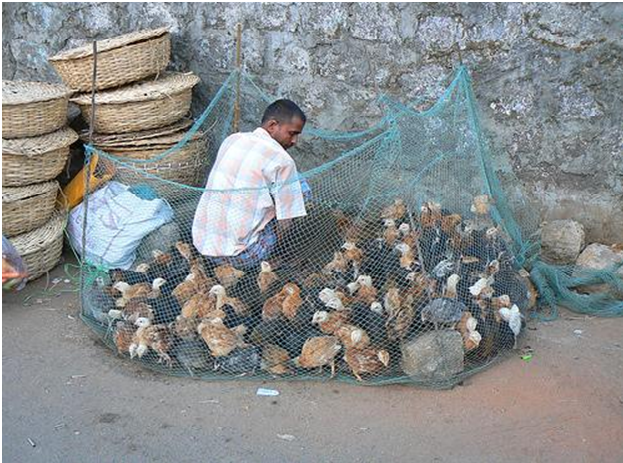Are The WTO Chickens Coming Home to Roost
American now?

NEW DELHI: In what comes as a major setback to India, the World Trade Organisation has directed the Modi government to lift restrictions on the import of poultry from the United States. It is not clear, however, whether India will appeal against the decision with concerned ministries here now clearly awaiting instructions from the Prime Ministers Office.
The WTO decision flies in the face of India’s position of not lifting the trade barriers, a major irritant in its current relations with the US.
A WTO dispute panel has ruled that restrictions imposed by India on the import of poultry from America were “inconsistent” with international norms. It found no basis in India’s position that the ban was in keeping with international concerns of animal health. The panel went with the US position that the Indian decision was not based on international standards and was in fact discriminatory.
The US poultry industry has been particularly keen to export to India, for what was seen as a over $ 300 million market a couple of years ago and has only increased in monetary value since then.
A decision will be taken by the Prime Ministers Office for or against an appeal on this decision. The concerned ministries are reportedly awaiting instructions, and it remains to be seen whether Prime Minister Narendra Modi travels the logical course in keeping with the Indian decision to block free trade barriers, or whether this setback will open the door for easing the restrictions altogether.
The rather tasteless mega event organised by the Indian origin community for PM Narendra Modi in New York could not take away from the hard business that topped the two quick meetings between him and US President Barack Obama. Free trade barriers topped the US agenda, and while both sides agreed not to talk about this publicly it was clear that the issue had not just been raised but discussed by the two sides. It is of course not known, if any agreement was reached, and whether the US President was able to extract any assurances from the Indian leader.
But has always been the case in US-India relations, answers to hidden negotiations are mostly evident in the actions that follow. And hence the PM’s decision about going in appeal against the WTO dispute panel’s decision will determine whether the government has softened its stand, or whether it will follow the hardline approach on the WTO issue that has currently topped the civilian nuclear agreement deal as the top irritant in India-US relations.
Washington had made it clear before PM Modi set foot in the US that this remained a major issue in bilateral relations. US State Department officials briefing the media went on record to underline the differences between the two countries on this, and hoped that the matter would be discussed and resolved.
To drive this home, even as PM Modi was in the midst of his “Make India” campaign on the eve of his departure for the US, influential business associations and the US Chamber of Commerce wrote to President Obama urging him to pressure the Indian PM to remove barriers to free trade. These top business concerns questioned the latter’s ‘reformist” credentials in the letter that essentially gave a mandate to the US President to up the ante on this issue during his meetings with PM Modi.
“Since taking office, Prime Minister Modi has declared India ‘open for business’ and promised to incentivise investment and give the world a favourable opportunity to trade with and produce in India,” the Alliance for Fair Trade with India said in a letter to Obama.
“Thus far, however, the new Indian government has produced troubling policies of its own,” the group said, adding “these actions send perplexing and contradictory new signals about India’s role in the global marketplace.”
US Congressional leaders dealing with trade and finance also wrote to the US International Trade Commission calling for a second investigation into India’s “unfair” trade practices to bring home the point that there was powerful opinion within the US that expected India to deliver on this front before seeking better relations with Washington.
The government is under pressure at home not to relent on this issue. And any movement backward would have also impacted on the elections in Maharashtra and Haryana. However, now all eyes are on the PMO to see what course it adopts, as a review will keep India-US relations under tension. Conversely, silence and acceptance of the WTO dispute panel’s verdict will send out signals to US investors that New Delhi is more amenable, and will not stick to a rigid position on this globally controversial issue.



